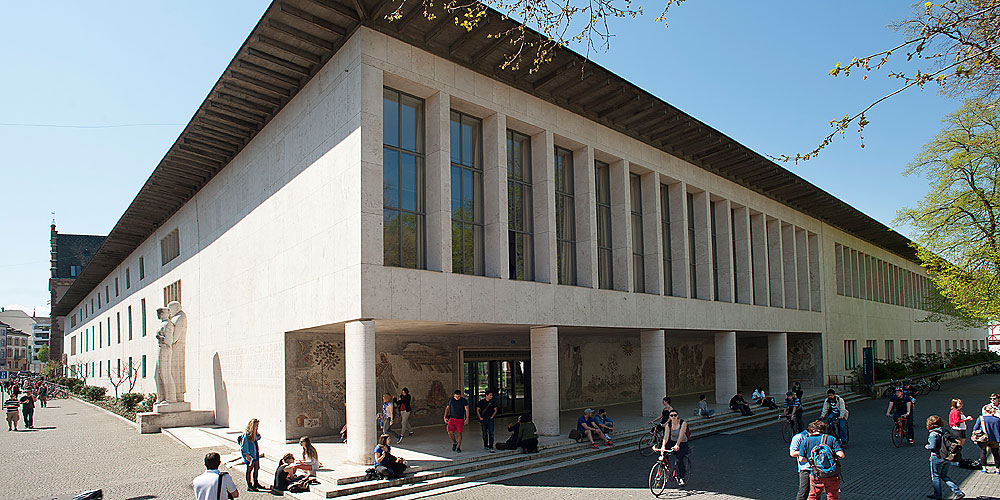Consultation procedure underway for the University of Basel’s Strategy 2022–2030
Following its submission to the University of Basel Senate, Strategy 2022–2030 has entered the consultation period. The final version is scheduled to be finished and approved by the University Council in the fall.
05 April 2019
Over the past few months, the University Council and university management have been drafting Strategy 2022–2030 in cooperation with various groups at the University of Basel. The University Council approved the draft during its most recent session. Its submission to the members of the Senate marks the start of the University of Basel’s consultation process for Strategy 2022–2030. Over the next few weeks, various groups at the University of Basel will have the opportunity to discuss their concerns and interests. Following revision, the final version is expected to be adopted by the University Council in fall 2019. Strategy 2022–2030 serves as the basis for drafting the funding request to the supporting cantons for the performance period 2022–2025.
The University of Basel’s Strategy 2022–2030 sets the course for its successful development over the next 10 years, furthering its aim of positioning itself as an outstanding teaching and research institution that has strong, clear ties both regionally and internationally. As a distinguished university, the University of Basel strives to offer the best conditions for research and challenging, well-rounded studies for its students. It sees the increasingly fierce competition at a national and international level as an incentive to constantly improve and further increase the contribution to scientific progress, innovative strength and the appeal of the entire Basel region as a place to live and work.
Four strategic principles
The general framework for individual strategic targets and measures is formed of four overall principles. Under the principle of “promoting agility,” the university seeks to connect decentralized spheres of action with agile leadership structures and efficient organization. “Opening up the university” refers to the aspiration to expand cooperation with partner institutions, maintain close contacts with politics, business and society, and make an active contribution to the social and cultural life of the region. The principle of “strengthening identification with the university” describes the wish to fully engage all members of the university with its strategic objectives in a motivating environment, and with a vision that also inspires policy makers, the business sector and the general public. Finally, with the “use of locational advantages,” the university aims to intensify collaboration with regional partners even more in the coming years, further tapping into the unique benefits that exemplify the cultural sphere and business sector in the three-country region.
Targets in five thematic areas
The University of Basel’s exceptional academic performance will continue to increase its international visibility and appeal in the field of research. A new think tank will advise the President’s Board on strategic issues to develop research in new thematic areas. In connection with the digital transformation, the university will strengthen areas involving the latest technology and secure access to research-relevant data.
Teaching at the university aims to equip students to operate independently, competently and responsibly in academia, business and society. In this regard, the benefits of being a research university will be better utilized in the area of teaching. A key focus will also be on engagement with the various dimensions of the digital transformation. The university will also seek to further support and strengthen the university community. In a vital culture of diversity and sustainability, particular emphasis is placed on inclusion management and intercultural skills.
An expansion of national and international partnerships will further enhance the University of Basel’s appeal. The aim is to increase student mobility and expand joint doctoral programs. Increased collaboration with other research-focused universities will strengthen specific research areas. In addition, the university seeks to assume a central role in the regional innovation ecosystem, to promote the establishment of spin-offs and start-ups, and to intensify collaboration with companies, without compromising freedom in teaching and research.
Two projects to strengthen societal impact
The university aims to strengthen its societal impact with two strategic projects: as part of the Eucor alliance, Bio-Campus Upper Rhine will be expanded to become Europe’s leading life sciences innovation cluster. The objective is to form a networked ecosystem characterized by innovation and momentum, visible beyond the three-country region and internationally. The Forum Basiliense will create an international platform and address key issues relevant to society, with interdisciplinary projects covering current, political, economic and social areas.
Funding principles
In the face of intensifying national and international competition for outstanding academics, cooperation partners and research funding, the university must actively evolve and improve, take efforts to improve its visibility on the global stage and remain attractive. This will also require further investment. To broaden its financial base, the university will expand and professionalize its fundraising activities. At the same time, it relies on sufficient support from the supporting cantons and the federal government. This is imperative in order to implement Strategy 2022–2030 and continue to develop and grow for the benefit of the region.
Further information
Matthias Geering, University of Basel, Head of Communications & Marketing, phone: +41 61 207 35 75, mobile: +41 79 269 70 71, email: matthias.geering@unibas.ch


